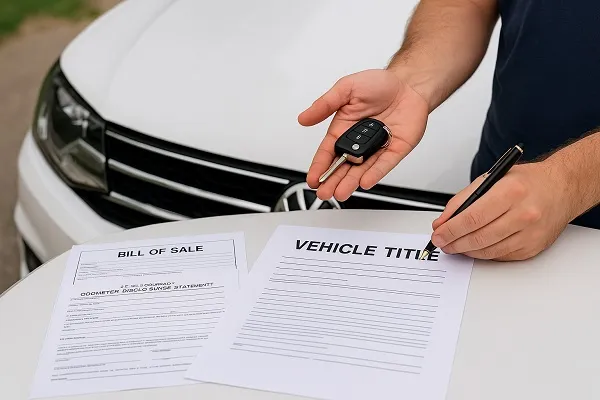Selling a vehicle with missing paperwork in Colorado can feel overwhelming, but it’s a challenge many sellers face. Whether you’ve misplaced the title, never received certain documents from the previous owner, or are dealing with an inherited vehicle, there are specific steps and legal options available. Understanding Colorado’s vehicle sale regulations is essential to avoid penalties and ensure a smooth transaction.
Why Paperwork Matters When Selling a Vehicle
Selling a car isn’t just about handing over the keys. The paperwork legally transfers ownership and protects both the buyer and seller from future liabilities. In Colorado, the most important documents typically include:
- The Certificate of Title
- Bill of Sale
- Emissions Test Certificate (if required)
- Odometer Disclosure Statement
- Valid ID from the seller
Missing any of these can delay or even prevent the sale—especially if you’re dealing with a lost title.
Common Scenarios for Missing Paperwork
Lost or Misplaced Title
This is the most common situation. You had the title at some point, but it’s no longer accessible. Fortunately, Colorado allows for a duplicate title request.
Never Titled in Your Name
If you bought the vehicle and never titled it in your name, selling it becomes more complex. Colorado law requires sellers to be the legal titleholder.
Inherited Vehicle Without Proper Documents
In the case of inheritance, you may not have immediate access to the title or registration. Probate or small estate processes might be necessary.
Abandoned Vehicle on Your Property
If a vehicle was left on your property and you want to sell it, this is handled under abandoned vehicle laws and is a completely different process.
Can You Legally Sell a Car Without the Title in Colorado?
Technically, you cannot legally complete a private vehicle sale in Colorado without a valid Certificate of Title. The title proves ownership, and without it, the buyer can’t register the car in their name.
However, Colorado offers pathways to resolve the issue:
- Apply for a duplicate title
- File for a bonded title
- Proceed through probate or affidavit of heirship if the owner is deceased
- Work through the abandoned vehicle process if you are not the rightful owner
Let’s break these down.
Applying for a Duplicate Title

If you are the titled owner but lost the document, this is the simplest solution.
Steps to Request a Duplicate Title:
- Complete Form DR 2539A: Application for Duplicate Title.
- Provide Valid Identification: Your Colorado driver’s license or ID.
- Pay the Fee: The duplicate title fee is usually $8.20.
- Submit to the DMV: You can mail the form or visit a Colorado DMV office.
The new title is typically issued within 10–14 business days. Once received, you can move forward with the sale.
Selling a Vehicle Without Title Using a Bonded Title
If the title is unavailable and there are issues verifying ownership, you may apply for a bonded title.
When a Bonded Title is Needed:
- The vehicle was never titled in your name.
- You bought it from someone who didn’t provide a valid title.
- The DMV doesn’t have a record of the vehicle.
Process to Get a Bonded Title:
- Contact the DMV: Request a title record search.
- Vehicle Appraisal: Get a value assessment (used for the surety bond).
- Obtain a Surety Bond: Usually 1.5 times the vehicle’s value.
- Submit Bonded Title Application: With all documentation, bond, and fees.
This title proves ownership for three years, after which you may be eligible for a regular title.
Required Forms for Selling a Vehicle in Colorado
When the paperwork is incomplete, ensure the following forms are in place before completing any sale:
- Form DR 2407 (Bill of Sale): Documents the sale and includes vehicle info, price, and signatures.
- Form DR 2173 (Duplicate Title Request): If applicable.
- Odometer Disclosure Statement: Required for vehicles under 10 years old.
- Emission Test Certificate: Required for vehicles registered in certain counties.
Even without the title, these forms are important for proving intent and initiating ownership transfers.
What to Tell the Buyer If the Paperwork Is Missing
Transparency is key. Inform the buyer upfront that the title or documents are missing and explain the steps you’re taking—or have taken—to fix the issue.
Tips for Handling the Buyer Conversation:
- Offer to sign a notarized bill of sale
- Explain the status of the title or bonded title application
- Be honest about any delays or complications
- Share DMV contact info for confirmation
Trying to sell a vehicle under false pretenses could result in legal action or fines.
Can a Notarized Bill of Sale Replace the Title?
No. In Colorado, a notarized bill of sale is not a legal replacement for a title. It’s useful documentation, but the DMV will not accept it as proof of ownership by itself. However, it may support a bonded title or other legal process when the title is unavailable.
Selling a Vehicle as Junk or for Parts Without a Title

If your vehicle is non-operational and you’re selling it for scrap or parts, the process can be slightly different.
Options:
- Junkyard or Salvage Yard: Many will accept vehicles without a title if you show a valid ID and sign a release.
- Bill of Sale: Still required in most cases.
- Vehicle Affidavit: Some yards may require a sworn affidavit claiming ownership.
Make sure to verify the buyer’s requirements before delivery. Even junk cars have to be properly documented in Colorado.
When to Involve a Mechanic’s Lien or Legal Help
If you’ve done work on a vehicle and the owner never paid or returned, you may be able to pursue a mechanic’s lien. This is a legal process requiring court filings and DMV paperwork.
If the situation is complicated—such as a disputed ownership, inheritance, or potential fraud—consulting an attorney or title specialist may save time and avoid legal pitfalls.
Final Tips for Selling a Vehicle With Missing Paperwork
- Start with a title search: It’s the foundation for any next step.
- Keep copies of all forms, communications, and applications.
- Educate the buyer: Make sure they understand the situation and risks.
- Use the DMV as a resource: Their offices and website offer helpful tools.
Selling a vehicle without all the paperwork in Colorado isn’t impossible, but it does require careful steps. If you act transparently and follow the legal options available, you can still complete the sale safely and legally.
Content reviewed and published by Sell My Car Colorado Editorial Team.
